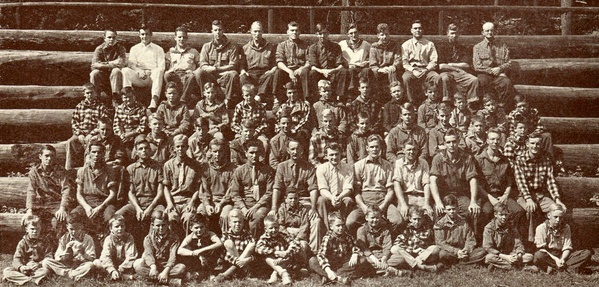 La Jeunesse Camp class of 1937
La Jeunesse Camp class of 1937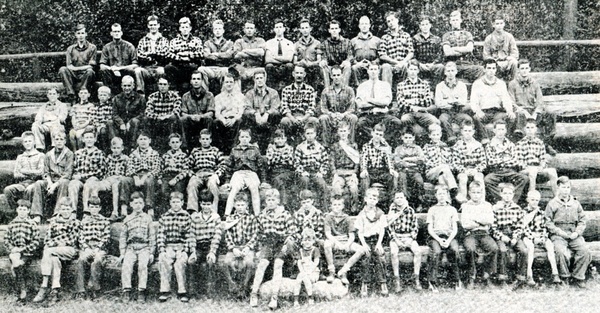 La Jeunesse Camp class of 1940. Founder is seventh from the right, third row.
La Jeunesse Camp class of 1940. Founder is seventh from the right, third row.
Adirondack Daily Enterprise, July 4, 1992 La Jeunesse was a summer camp for boys opened in 1916 by Thomas Blagden on Fish Creek Ponds, west of Saranac Inn; they also had a location on Fish Pond, to the north. This predated the construction of state route 10 (which later became New York route 30) and the state campground at Fish Creek. After Blagden's death, the camp was operated by his son, Henry Blagden. The camp closed in 1954.
New York Sun, July 6, 1919
The La Jeunesse school for boys, each summer a feature of the life on the Upper Saranac, has been opened by Harry Blagdon of Washington, who arrived early in the week with forty-five boys.
Adirondack Daily Enterprise, July 4, 1992
La Jeunesse first of Adirondack children's camps
Over the years those parents who had enjoyed the Adirondacks by way of ownership of a private camp, or by vacationing at any of the old resort hotels, perhaps decided that their offspring should be treated to the same special privileges. Of course childrens' summer camps were not an Adirondack invention but, on the other hand, they could provide an Adirondack experience and that was what it was really all about. Nostalgia related to a mountain lake, a forest stream, or a bark covered lean-to could evoke past camping adventures which, by parental decree, must be inherited by the following generation.
 The Lodge on Fish Creek, from the 1938 La Jeunesse brochure:
The Lodge on Fish Creek, from the 1938 La Jeunesse brochure:
"THE Old Timers' Lodge, the latest addition to the Camp, was built in the summer of 1933. During 1923, at a Camp "Powwow", the idea was suggested that at some future date a lodge or club house be erected for "Old Timers". At the close of the season on the night of the annual banquet, a sum of money made up from voluntary contributions by the boys was presented to the Camp. This was the start of the Lodge Fund which was added to each year until 1933 when an anonymous contribution made the building a reality. The Lodge provides a home for the director and comfortable quarters for the Alumni when they return to visit the Camp."
(Courtesy of Jan Clark Daly)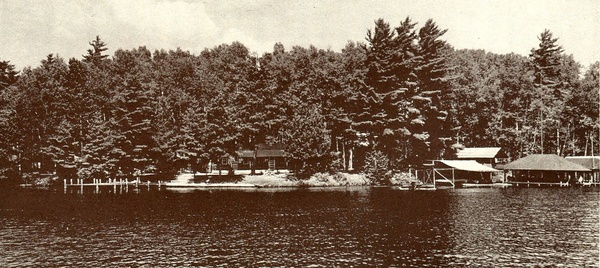 Part of the Camp as seen from the water, from the 1938 La Jeunesse brochure: (Courtesy of Jan Clark Daly)There were, and still are, many types of summer camps, boys' camps, girls' camps, and, of late, some coed. There could be a fixed location whereby the participants spent their entire term at a central camp while enjoying the normal routine of outdoor sports such as swimming, boating, archery, and hiking. There could also be a mobile type arrangement featuring canoe trips, mountain climbing, and overnight stays at both private or public campsites. This latter version was usually called "roughing it."
Part of the Camp as seen from the water, from the 1938 La Jeunesse brochure: (Courtesy of Jan Clark Daly)There were, and still are, many types of summer camps, boys' camps, girls' camps, and, of late, some coed. There could be a fixed location whereby the participants spent their entire term at a central camp while enjoying the normal routine of outdoor sports such as swimming, boating, archery, and hiking. There could also be a mobile type arrangement featuring canoe trips, mountain climbing, and overnight stays at both private or public campsites. This latter version was usually called "roughing it."
La Jeunesse combined the better components of the two systems with an added emphasis on woodcraft education. The story begins with a physical ailment that altered one man's career from a life in the world of business to a healthier outdoor existence. Just as Dr. Trudeau's tubercular affliction led to great accomplishments in the field of medicine so, too, did an eye problem force Henry Blagden to abandon the iron industry. Rather than becoming a forger of steel Henry devoted his lime to the forging of the lives of young men. As it turned out the decision was a most propitious development for both himself and for the boys who would attend his summer camp in the Adirondacks.
As a young man about to enter Yale Henry suffered an acute eye ailment and was advised by his doctor to avoid any type of work that could worsen the condition. Abandoning his hopes for book learning he entered into the malleable iron industry but once again his eyesight problem returned and this time his doctor recommended some sort of outdoor occupation.
An old friend, Eric Parson, was starting to open a boy's school at Pinehurst, North Carolina, and Blagden joined him in the project. When Parson learned that Henry owned some camp equipment in the Adirondacks, it was suggested that they combine forces and operate a summer camp in the vicinity. The die was cast and on July 1, 1916, they opened camp on Big Square Pond with 15 boys in attendance. It was a simple affair consisting of a tent and a lean-to. An infantile paralysis epidemic broke out that same summer so to avoid any possible contagion the camp was moved to Fish Pond where Henry's father had built a lean-to several years earlier. At the end of the season Henry returned to Pinehurst to join Parson's staff.
Permanent camp
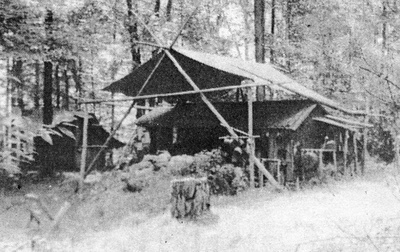 Blagden Lean-to at Fish Pond (undated)
Blagden Lean-to at Fish Pond (undated)
Adirondack Daily Enterprise, July 4, 1992With the outbreak of World War I, in 1917, Henry tried to enlist but was turned down because of his eye problem. This rejection apparently made up his mind to continue the project of forming a permanent type of summer camp for boys in the Adirondacks. He was able to prepare some shared property on the easternmost Fish Creek Pond, adjacent to Upper Saranac Lake, an ideal place to build his camp. At first he wanted an Indian name for the endeavor but could not find anything suitable. His mother suggested "La Jeunesse" and it caught on.
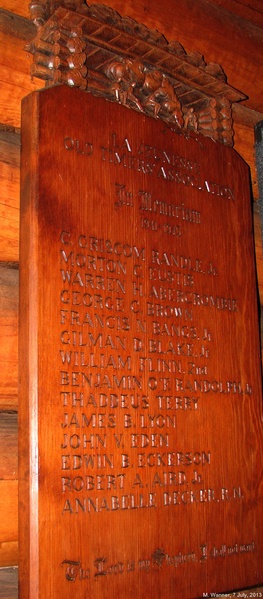 A La Jeunesse plaque on the wall of the Church of the Ascension in Saranac Inn. La Jeunesse Old Timers' Association. In Memoriam, 1911-1941. C. Griscom Randle, Jr.; Morton C. Eustis; Warren H. Abercrombie; Francis N. Bangs, Jr.; Gilman D. Blake, Jr.; William Flinn, 2nd; Benjamin O'F. Randolph, Jr.; Thaddeus Terry; James B. Lyon; John V. Eden; Edwin B Eckerson; Robert A. Aird, Jr.; Annabelle Decker, R.N. The Lord is my Shepherd, I shall not want.
A La Jeunesse plaque on the wall of the Church of the Ascension in Saranac Inn. La Jeunesse Old Timers' Association. In Memoriam, 1911-1941. C. Griscom Randle, Jr.; Morton C. Eustis; Warren H. Abercrombie; Francis N. Bangs, Jr.; Gilman D. Blake, Jr.; William Flinn, 2nd; Benjamin O'F. Randolph, Jr.; Thaddeus Terry; James B. Lyon; John V. Eden; Edwin B Eckerson; Robert A. Aird, Jr.; Annabelle Decker, R.N. The Lord is my Shepherd, I shall not want.
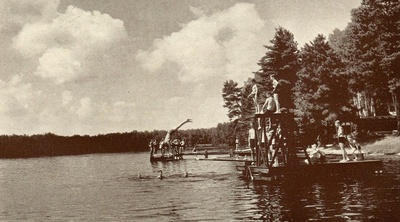 Swimming. from the 1938 La Jeunesse brochure: (Courtesy of Jan Clark Daly)
Swimming. from the 1938 La Jeunesse brochure: (Courtesy of Jan Clark Daly)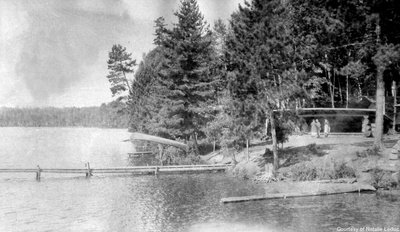 Blagden Lean-to at Fish Pond (undated)
Blagden Lean-to at Fish Pond (undated)
Adirondack Daily Enterprise, July 4, 1992For the season of 1917, rough sleeping quarters and a "dining shack" served the purpose but in 1918, the enrollment doubled and further construction became necessary. An infirmary was built to house any of the boys down with colds or other minor ailments. On the following year the enrollment doubled again and additions to the kitchen and dining areas featured running water for the first time. The boys took an active role in the construction and in 1921 they built a huge log lean-to where evening sessions before the fireplace were enjoyed. "Hank," as the boys called him, mentioned that it would be nice to have a log type lodge to serve as headquarters and provide quarters for gathering in future years. At the end of the season he was presented with a check of $300 which the campers had raised to start a building fund. And so it went with each new season bringing increased enrollment and more construction.
 La Jeunesse, 1943
La Jeunesse, 1943
Front row, left to right: Joe Brown, Rod Hinwood, Sam Bodine, Hank Blagden (Director/owner), Wynne Wister, Welby Whitten, Jim MCurdy.
Back row, Charlie Howzie, Don Hagerman, Hugh Scott, ?, Floppy McLeod, Tom Armstrong, Munson Baldwin.
Photograph by Bernard M. Acosta.
Courtesy of the Adirondack ExperienceDiscipline was an important aspect of the curriculum at camp to aid in character development. There were all sorts of games and contests which were enjoyed with great enthusiasm but the highlight of the schedule was the stay at the Fish Pond campsite. Here the boys could fish for trout, cook over an open fire, and hone their skills of woodcraft under the care of monitors slightly older than himself. A canvas canopy stretched over the lean-to and fireplace and a tent furnished shelter from the rain but mostly the boys enjoyed outdoor living. Perhaps the sense of isolation in a wilderness setting heightened the pleasure of their stay.
Improvements made
As mentioned earlier the lean-to had been built by Henry's father, Thomas Blagden, who had also constructed a five mile wagon road from Saranac Inn to the south shore at Fish Pond. The campsite was situated on the north shore. Later the state acquired the property and the wagon road became a fire trail closed to all but state vehicles. The route from La Jeunesse went by truck to Hoel Pond, across Hoel and Turtle Ponds by canoe and then a tough carry over Clamshell Hill to Clamshell Pond. An easier carry from Clamshell Pond to Fish Pond and thence to camp. It was this route which provided the remoteness.
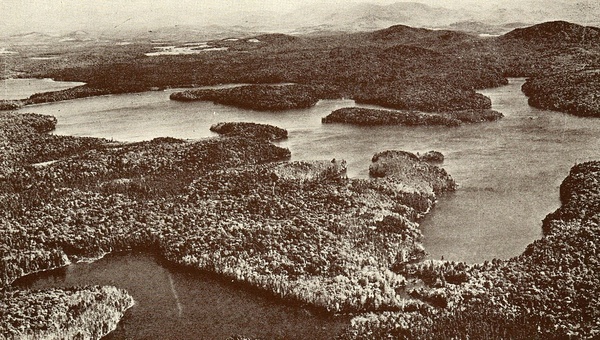 Air View of Country East of Camp (Upper Saranac Lake)
Air View of Country East of Camp (Upper Saranac Lake)
From the 1938 La Jeunesse brochure: (Courtesy of Jan Clark Daly)
Meanwhile, back at the main camp, tennis courts were added during the 1920s but, nearby, other types of improvements were taking place which upset the privacy at La Jeunesse. State highway No. 10 (today's route 30) was being pushed through right next to the northwest boundary of the camp property and across the highway to the west the state was constructing a public campsite at Fish Creek Ponds. To block out the unfavorable encroachment of progress Henry built a large storage shed adjacent to the highway and a stockade across from the entrance to the state campsite. Both buildings helped to muffle the highway noise and the stockade housed a store to sell supplies to the Fish Creek campers. Profit from the sales of food and gasoline brought new prosperity to La Jeunesse in the form of a scholarship fund. A policy had been established to accept as many boys (who could not pay) as the income would permit. By mixing with the boys from wealthy families Henry felt that the experience would benefit both parties and this policy proved to be judicious.
 The LodgeDuring the season of 1930 electricity was introduced at La Jeunesse and former members accused the new members of being soft. There existed a strong contingent of "old timers" who frequently returned to visit Hank and check up on the affairs at camp. Members of the alumni group [missing] also would serve as living quarters for Henry and provide visiting space for former campers. The lodge was completed in 1933 and two years later Hank married the former Miss Mary Bradley whom he had known for many years.
The LodgeDuring the season of 1930 electricity was introduced at La Jeunesse and former members accused the new members of being soft. There existed a strong contingent of "old timers" who frequently returned to visit Hank and check up on the affairs at camp. Members of the alumni group [missing] also would serve as living quarters for Henry and provide visiting space for former campers. The lodge was completed in 1933 and two years later Hank married the former Miss Mary Bradley whom he had known for many years.
A La Jeunesse Old Timers' Association was formed and its members published a little newspaper entitled "SMOKE" (no doubt suggested by campfire emissions) and many of the dates and details in this article were gleaned from its pages. Letters written to the paper displayed a lasting interest in camp affairs by the alumni which indicated a strong loyalty unusual in the realm of summer camps. Such fealty speaks well for the administrative policies practiced at La Jeunesse over the years.
One such letter is worth repeating here as an old timer wrote: "I do not know if there is another camp for boys in this country that can match what La Jeunesse has done for the past 25 years. I do know (as an Old Timer and parent) that La Jeunesse is different from any other boys' camp I know of. It has behind it the strength and vitality of an idea that is a living actuality in helping boys to become better men. It has left its impress for the better on everyone who has been there. Yes, Hank has done a swell job of youth building." A fine accolade indeed!
La Jeunesse
A SUMMER CAMP FOR BOYS
IN THE ADIRONDACKS
Henry H. Blagden, Director
This book is sent out each year to all the alumni and friends of the Camp, assuming they are interested in the progress of the Camp from year to year. It would be appreciated very much if, after you have read it and have no further use for it, you would pass it on to one of your friends.
General Statement
THE Camp is located on the north shore of "The First Fish Creek Pond" in Township Twenty, Franklin County, New York. It is five miles by motor car and about six miles by motor boat from Saranac Inn. From New York City the Camp is reached in twelve hours over the Adirondack Division of the New York Central.
This particular part of the Adirondack region was chosen for the location of the Camp because of its natural advantages; the altitude is 1,572 feet; the atmosphere is pure and invigorating. The Camp is on a lake which is the center of many lakes of great natural beauty, set in primeval forests and surrounded by mountains, many of them famous old landmarks — Whiteface, Marcy, Mclntyre, Ampersand, St. Regis, and Long Pond.
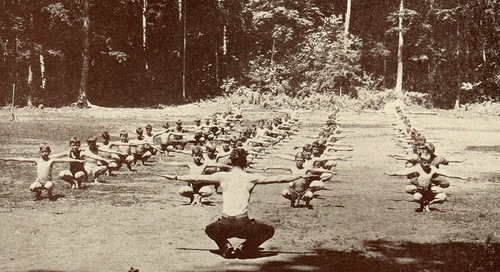 11:30 A.M. Before Swim
11:30 A.M. Before Swim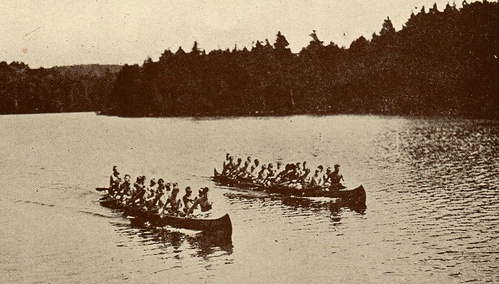 War Canoes. From the 1938 La Jeunesse brochure: (Courtesy of Jan Clark Daly)
War Canoes. From the 1938 La Jeunesse brochure: (Courtesy of Jan Clark Daly)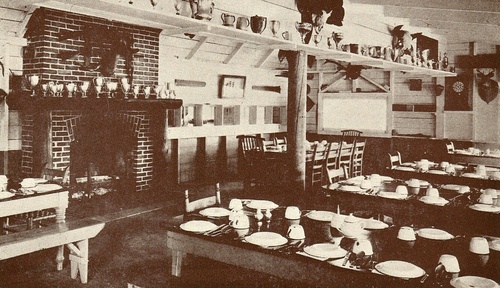 A corner of the Dining Room.
A corner of the Dining Room.
From the 1938 La Jeunesse brochure: (Courtesy of Jan Clark Daly)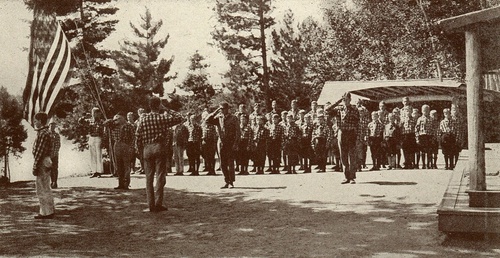 Retreat. From the 1938 La Jeunesse brochure: (Courtesy of Jan Clark Daly)Camp Life
Retreat. From the 1938 La Jeunesse brochure: (Courtesy of Jan Clark Daly)Camp Life
THE boys live in "shacks" and tents. The beds are single army cots. The boys are held responsible for the condition of their quarters, which must be neat and in order at all times. The boys do practically all the camp work. Life in camp tends to emphasize the qualities which go into the making of individuals who are energetic and self-reliant. A daily program fosters the habit of punctuality; a variety of activities avoids monotony and provides interest for any normal boy. The daily program is designed, not for the purpose of repressing the life of the boys, but for giving them an opportunity to choose their activities. With this in view, leads are suggested for the morning and afternoon re creation periods. Following is the daily schedule:
7:30 Reveille
8:00 Assembly for prayers
8:15 Breakfast
9:00 Inspection of quarters
9:30 Study, athletics, etc.
11:30 Calesthenic drill and swim
12:30 Dinner
1:15 Rest hour
2:15 Games, athletics, sailing, hikes, fishing, target practice, etc. 5:00 Personal inspection — Retreat 6:00 Supper 8:45 Call to quarters 9:00 Taps
On Sundays the boys attend the service in the Union Chapel at Saranac Inn. The religious influence is non-denominational. On Sunday afternoons the boys are at home.
IT IS THE ONLY DAY PARENTS AND GUESTS ARE EXPECTED TO VISIT THE CAMP.
Expeditions
FREQUENT trips are made through the lakes, over the trails and up the mountains. Great care is taken to keep these expeditions free from fatiguing tramps and long carries. These expeditions are beneficial to the boys, who become self reliant, observant and independent. THERE IS NO EXTRA CHARGE FOR THESE ALL-DAY HIKES AND CAMPING TRIPS.
Outfit
WHEN an explorer prepares for an expedition he is very careful in selecting his outfit, because he knows that if he does not prepare for all conditions, he will suffer hardships and ill health. If parents will do likewise when they are selecting their boys' outfits, they will insure them health and happiness, and help the men who shoulder the responsibility of their care.
The following list is suggested for the welfare and comfort of the boy, and is not compulsory. The items with an x before them are required. The sleeping bag is the most important of them all.
Camp Store
DUE to the fact that parents have difficulty in purchasing a number of the items on the following list, the Camp has a store. This store is operated for the convenience of the parents and the boys. The articles can be purchased at a saving and the small profit derived from the sales is credited to the camp scholarship fund. The items on the list which have C. S. before them can be purchased at the Camp Store. All other items on the list must be obtained elsewhere.
All articles must be marked with the owner's name in full in a CONSPICUOUS PLACE. Also ma\e and send with outfit two complete lists of every article the boy brings, one for the monitor in charge for weekly inspection and one for the camp records. BE SURE TO SEND EXTRA NAME TAPES.
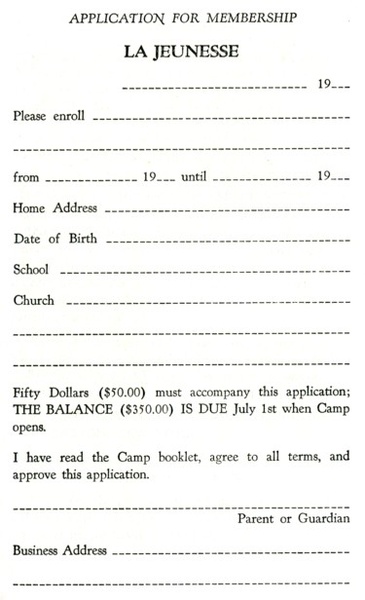 Application Form.
Application Form.
From the 1938 La Jeunesse brochure: (Courtesy of Jan Clark Daly)A Boy's Complete Outfit is as Follows
C. S. x 1 Sleeping Bag with waterproof cover, and not less than six thicknesses of wool blanket.
C. S. 1 Combination Pack Harness for carrying the bag.
C. S. x 1 Soft Felt Hat
C. S. x 2 Black and White Mackinaw Shirts
C. S. x 1 Pair Moccasin Shoe Packs
C. S. x 1 Pair Low Moccasins or low crepe sole shoes
x 4 Pairs Khaki or Gabardine Knickerbockers or Trousers
x 4 Gray or Khaki Flannel Shirts
x 6 Pair Woolen Stockings
x 1 Heavy Sweater (gray, blue, or khaki color)
x 1 Pair of Tennis Shoes
C. S. x 1 Slicker or Raincoat
x 1 Bathing Trunks
C. S. x 1 Scout Cooking Outfit
C. S. 1 Scout Hatchet
C. S. 1 Scout Knife
C. S. 1 Rucksack
C. S. 1 Compass
C. S. 1 Fishing Rod, equipped with reel to hold not less than 50 yards of line; hooks, sinkers, spoons, leaders, etc. Prepare this outfit for catching lake and brook trout, bullheads, pike and bass
C. S. 1 Tackle Box to hold fishing outfit
x 4 Suits of Pajamas
4 Pillow Cases
x 4 Large Bath Towels
x 2 Wash Cloths
C. S. x 1 Nail Brush
C. S. x 1 Nail File
C. S. x 1 Case Toilet Articles
C. S. x 2 Laundry Bags
Boys are encouraged to bring kodaks, field glasses, musical instruments, and books about birds, animals, flowers, forestry, manual training, etc.
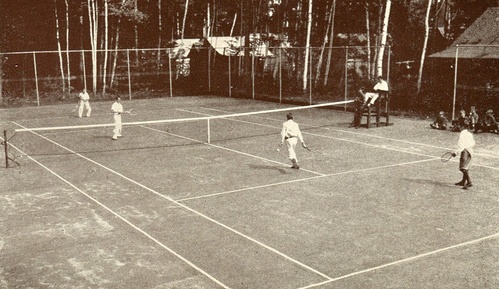 Tennis. From the 1938 La Jeunesse brochure: (Courtesy of Jan Clark Daly)Tennis THE Camp is equipped with two splendid tennis courts and the boys are taught the rudiments of the game.
Tennis. From the 1938 La Jeunesse brochure: (Courtesy of Jan Clark Daly)Tennis THE Camp is equipped with two splendid tennis courts and the boys are taught the rudiments of the game.
Manual Training Shop
THE work shop is large, well-lighted and well-equipped for boys who are interested in carpenter work. It is a popular pastime in bad weather.
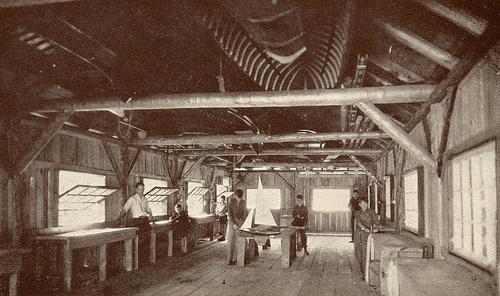 Manual Training Shop. From the 1938 La Jeunesse brochure: (Courtesy of Jan Clark Daly)Target Practice
Manual Training Shop. From the 1938 La Jeunesse brochure: (Courtesy of Jan Clark Daly)Target Practice
BOYS are taught the danger of firearms, how to handle a gun and how to shoot. The Camp is very well equipped for this work, but if a boy wishes to bring his own gun he may do so. The gun must be given to the director as soon as the boy arrives at Camp, and it will be put in the Gun House. The director personally takes charge of the shooting.
Boxing and Wrestling
BOYS have an opportunity to learn the art of boxing and wrestling with a competent and careful instructor.
Camp Bank
WHEN entering, the boy must deposit not less than five dollars in the Camp Bank, for which he will be given a receipt and a check book. If he wishes money to make a purchase of some sort, and if the director approves, he must make out his check, and write on it what the money is to be expended for. At the end of the season the boy will be given his balance and the cancelled checks. If a boy has valuables he wishes taken care of he may deposit them in the bank, and a receipt therefor will be given him.
Food and Water
THE food problem is given careful attention. Plain, simple food, and lots of it, of the best quality, prepared by experienced camp cooks, is served at regular hours. Fresh dairy products, meats and vegetables are provided. The drinking water is of pure analysis.
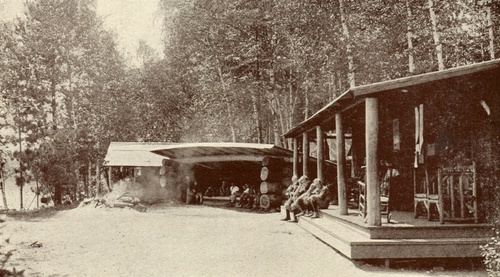 Rest Hour. From the 1938 La Jeunesse brochure: (Courtesy of Jan Clark Daly)Resident Nurse
Rest Hour. From the 1938 La Jeunesse brochure: (Courtesy of Jan Clark Daly)Resident Nurse
THE Camp employs an experienced resident nurse who has charge of the Camp Infirmary, constant supervision of the health of the boys, and attends to all minor ills. In case of extended illness, a special nurse will be engaged at the expense of the boy's parents or guardian.
Physician
GOOD physicians are accessible at all times.
Rules
WHEN a boy enters he is told the rules and is given to to understand that they must be obeyed. The main rule, which covers all, is:
"Every Member of the Camp Must be a Gentleman"
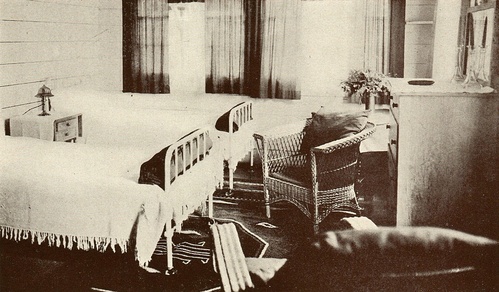 The Infirmary. From the 1938 La Jeunesse brochure: (Courtesy of Jan Clark Daly)Prizes
The Infirmary. From the 1938 La Jeunesse brochure: (Courtesy of Jan Clark Daly)Prizes
TO encourage ambition and a high standard among the boys a number of prizes are awarded each year for different activities and general excellence. Prizes for Activities, Best Inspection, Second Best Inspection, Best Target Practice, Largest Fish Caught, etc., are awarded to the boys having the largest number of points for the season. Prizes for General Excellence, Best All-Around Boy, Second Best, etc., are awarded through a ballot held at the end of the season by the whole Camp.
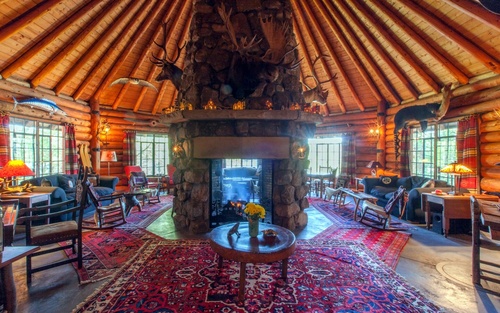 The interior of the Alumni Lodge, 2017. A portion of the original property, now known as Camp Conor, is for sale, listed by Merril L. Thomas. See listing here.Tutoring
The interior of the Alumni Lodge, 2017. A portion of the original property, now known as Camp Conor, is for sale, listed by Merril L. Thomas. See listing here.Tutoring
BOYS who are behind in their work at school, or those who wish to prepare for fall examinations, have a splendid opportunity to study with competent tutors. The charge for tutoring is at the rate of $2.00 per hour. It is important that parents write as soon as possible, preferably before June 1st, in order that definite arrangements may be made for subjects and time. It is also important that boys bring their text books.
Admission
ONLY boys of Christian parentage, of good character and gentlemanly behavior, sound of body, mind and health, between the ages of 9 and 18, are received in Camp. The right is reserved of rejecting any application and of severing any member's connection with the Camp at any time, if such action be deemed for the best interests of the Camp.
Application
THE Camp is equipped for and limited to about sixty-five boys. This fact makes it necessary for the director to know definitely as soon as possible whether or not the applicants are going to attend Camp. A check for fifty dollars ($50.00) must accompany the signed application;
THE BALANCE OF THE TUITION IS DUE WHEN CAMP OPENS. The advance payment of fifty dollars ($50.00) will NOT be refunded if the applicant fails to enter Camp. When boys are not personally known to the director, references are required.
Expense
THE charge for the two months' term, July and August, is $400.00. Boys may make special arrangements to enter June 1st however, and remain until October 1st. For this extra time the charge is $45.00 a week. These charges INCLUDE ALL HIKES AND TRIPS, but do not include allowances, tutoring, laundry, or incidentals. THERE IS
NO REBATE FOR LATE ARRIVAL, EARLY WITHDRAWAL, OR DISMISSAL.
Special arrangements may be made to enter a boy for one-half the regular term, and the charge for this period of attendance is $250.00. However, this is not encouraged, and it is expected that this arrangement will not be requested by parents unless circumstances demand it.
Serious Thoughts
FOR THE PARENT
IT would be well for parents to give serious thought to the matter of sending their boys to camp. To begin with, is the director the man you want for your son's father for the next eight weeks? Is this man in this work because he likes boys, and wants to see them get the proper foundation, to be honest, clean, straight-forward, God-fearing men, or is he in the camp business, running the place like a summer hotel, purely for the almighty dollar?
It is taken for granted that you have looked at all sides of this serious question, and have picked that man and the camp you want. Then it is well that you know why this man has a gray hair or two.
He has to pick a spot for his workshop or foundry. (The latter name would seem best, because the director's business in life is moulding lives.) Then he makes a large investment in land and equipment. This land and equipment is busy for three months at best, and the rest of the year it stands idle. Ways and means must be worked out to carry this plant, and also to provide him with bread and butter. It is his job to pick the monitors, the nurse, the cooks, the guides, etc. They are to be the moulders in his foundry. They must be the right sort physically, mentally and morally.
This done, he realizes that with a small group he must pick boys for his camp who will play together and be a helping influence on each other. The group is picked for the summer. Each boy is different, the raw material for the moulding process, that must be known, worked on, and sent home in two short months in better shape than when he arrived. The director thinks of you parents with your fine homes, factories, banks, stores, offices, and what not, all valuable material possessions. Yet the most treasured possessions, your sons, are sent to him that he may expose them to the hot sun, chilling rain, steep cliffs, white water, the tricks of the wind, and courageous adventure amid new surroundings. They will shoot on the rifle range, chop wood, build camp fires, etc.
Each boy will be thrown into a group of strange boys. You are willing to trust this man's judgment in the selection of his new friends and comrades. You do not know what they will bring him in mind and spirit — and yet, you believe the life in this group will be the kind which you would yourself desire. You expect your son to come home brown, healthy of body, clean of mind, and a good sportsman.
Is this not enough to make the man who shoulders all this responsibility sit in meditation, to take inventory of himself and wonder if he really equal to the job? It makes him review past summers with a careful and critical eye, and to wonder how he can make things better for the coming season.
Yes! This man has shouldered a heavy burden of confidence and trust. Yet this very fact, that he is entrusted with this big work, gives him the courage to go on, especially when letters come from parents telling him how happy they are to have their sons home, tanned, hard, and healthy in mind, body and spirit. A "pat on the back," so to speak, saying that the camp has made the boy over, and so forth. This gives him encouragement and the spirit to go on.
"The bitter needs must come with the sweet," however, so suppose your son comes home with a lot of bad ideas. Then you should tell the director all about it, and it will help him to find the weak spots. In other words, good constructive criticism is valuable and a tremendous help to the What has been said applies to all camps. Now for answering a few general questions asked La Jeunesse every year by parents.
What does a boy do at camp?
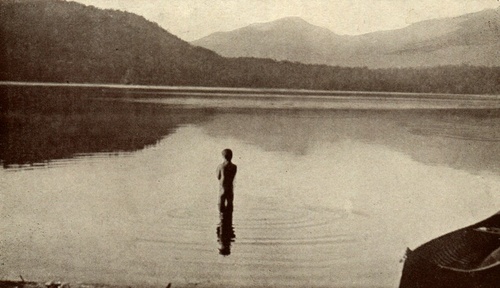 The Thinker. From the 1938 La Jeunesse brochure: (Courtesy of Jan Clark Daly)Each and every day is taken up with organized work and play. A schedule showing how each hour of the day is spent appears on page five of this booklet. In order that the boys may not feel repressed, each boy is asked twice a day, morning and afternoon, what he would like to do (provided of course he is not being disciplined for something). He has many activities from which to choose, such as fishing, canoe trips, hikes, boxing, wrestling, baseball, tennis, sailing, etc. All these activities are under close and constant supervision.
The Thinker. From the 1938 La Jeunesse brochure: (Courtesy of Jan Clark Daly)Each and every day is taken up with organized work and play. A schedule showing how each hour of the day is spent appears on page five of this booklet. In order that the boys may not feel repressed, each boy is asked twice a day, morning and afternoon, what he would like to do (provided of course he is not being disciplined for something). He has many activities from which to choose, such as fishing, canoe trips, hikes, boxing, wrestling, baseball, tennis, sailing, etc. All these activities are under close and constant supervision.
How many boys do you have?
Between fifty and sixty, with a limit of sixty-five.
What are their ages?
From 9 to 18. The average age, as a general rule, is between 10 and 14.
Do you group them according to age?
We try as far as possible to live as one large, happy family.
When the boys arrive at Camp we size them up. Then we form six tribes — the Mohawks, and so on. Each tribe has two or more boys of the same age, starting with the nine-year-old boys, and working up. This promotes good, keen competition, and has proved most successful in developing earnest applicaction and good sportsmanship. The tribe that has the highest standing in all the various games and competitive sports has the reward of going off on the first camping trip.
Where will my boy live?
The boys live in tents or "shacks". Two or tree boys and a monitor occupy each shack. The boys are quartered according to the influence they will have on each other.
Do you let them go out in canoes on the water alone?
No boy is permitted to go out in a canoe alone until he has passed the swimming and paddling tests. When these tests are passed the boys are permitted to go out in canoes within bounds, under the supervision of water monitors. At no time are the boys allowed to go fishing or on canoe trips alone, whether or not they have passed the tests.
What is the religious influence?
Only boys of Christian parentage are accepted. The religious influence is non-denominational.
How much money must I let my boy have?
When Camp opens $5.00 should be deposited in the Camp bank for him. Out of that he is allowed to spend not more than fifty cents a week for incidentals.
What will his outfit cost?
That all depends upon how much you wish to spend, and suggestions are given on page 9.
What will his laundry cost?
The average laundry bill for the summer is between eight and ten dollars.
Do the boys have any organized study?
No. If a boy is behind in his studies tutors are provided, and he can carry on with his studies along with the camp activities.
Do you take boys for one month?
Yes, but not without some regret. It does not seem fair to the boy, or to the camp, because four weeks is just about the length of time it takes a boy to "find himself" at camp. The routine of the healthful, well-ordered outdoor life starts to show results, and the boy has to leave.
Do all the boys carry heavy packs on the trips?
No monitors go on all trips and carry the heavy packs. If a boy is strong and old enough he carries his share.
Your tuition of $400.00 seems very high. Can't you cut it down?
This fee does seem high, especially in hard times such as we are now having, and a great deal of time and thought has been given to ways and means of reducing it without impairing the standards of the Camp. When you consider that this fee covers ALL CAMPING TRIPS, ALL DAY HIKES, FISHING TRIPS, AND EVERYTHING BUT INCIDENTALS, IT IS NOT HIGH. It can be cut, yes; but first the personnel must be reduced, then the food cheapened, many of the camping trips eliminated, etc. In the final analysis it would be found that the boy would be the loser and the camp standards lowered.
Do you take scholarship boys?
Yes, a limited number. The camp also takes a limited number at reduced rates. When a boy who makes application to the camps is of a high type, the kind of a boy the camp wants, but is not able to pay the full rate, he is given the benefit of available scholarship funds. These boys have all the advantages of the full-paid boys. In other words, there is no discrimination whatsoever, and all business transactions between parent and director are absolutely confidential.
Do you like to have your camp visited by parents?
Yes! It is most important for the parent to visit the camp and know the environment. The parent should see the camp under all conditions. If, however, they visit the camp without an appointment they must not expect the director and monitors to give them their time, as all have daily duties to perform and the boys are left idle while they talk. It is most important for the parent to discuss the boy and the camp with the director and the monitors in order to work together. A parent can make too many visits, from a psychological point of view. The visit, as a rule, leaves the boy a bit homesick and restless, and he has to adjust himself all over again to camp life, all of which takes time, and you must not forget that a boy has only two small months.
In conclusion I would like to give my frank opinion of a condition that has been felt and noticed in all camps during the past few years. Due to the economic condition of the country, and the general depression, everyone has been forced to cut down expenses and save wherever possible. A large percentage of parents have been cutting expenses by keeping their boys home from camp or sending them to less expensive schools. The question of economy is paramount with us today — but are we not getting economical to the point of destruction where education is concerned? The director personally feels that keeping a boy home from camp or changing his school is false economy, and the loss that is ultimately suffered by the boy cannot be measured in dollars and cents.
FOR THE BOY
You no doubt wonder what the boy has to do with "Serious Thoughts". Well, you see that no matter what you tackle in this life, when you get right down to business, analyze it and pick it apart, you find the serious side. Now perhaps you want to go to camp and perhaps you don't; in either case if you have never been you don't know anything about it.
We will picture this camp in the "North Country", on a lake surrounded by other lakes, so many that if you took a canoe trip every day all summer you could not see them all, and with just as many mountains to climb. You will find good fishing, lots of wild life — animals, birds, flowers, etc., The camp is equipped with canoes, motor boats, sail boats, tennis courts, baseball diamond, cinder running track, pingpong tables, workshop, a shooting range, wonderful swimming, etc., etc. Yes, it is like "the land of the sky-blue water" and "Boy Heaven".
You will find a man at the head of things who knows how to laugh and play with you and show you how to do all the things he has to offer. It is just as much fun for him as it is for you, and his job in life is teaching you how to play and work in his "workshop". He calls it his workshop because it is his work in life to play with you. He has a lot of young men called monitors to help him, one for every two or three boys. They are the foremen in the workshop, and all fine fellows. They are here to live, work, and play with you.
If you have never been at camp before it may be hard for you at first, because you will not find the comforts you are used to at home. The lake will be your bath tub, and you will make your own bed and care for your outfit; you will help sweep up your tent or shack; you will help wait on the table and wash dishes, etc. This is all work, but everyone has a hand in it, and before you know it, it is play and part of the fun. If you follow your leaders, obey them, and listen when they tell you how to do things, time will fly and you will get something out of camp life that will be a help to you all your days. That SOMETHING is what your parents want you to get. It is the right kind of foundation to start building your life on. THAT is the SERIOUS SIDE of coming to camp, and the nice part of it is, you get all this good while having a good time.
: It is hard to tell you what you will find at camp, but any normal boy should have a grand time, and if you make the best of your opportunity you will make your parents happy and you will be happy. We all want to be happy, and if we can learn to get fun out of work and play we are on the road to happiness.
FOR THE MONITOR
First —
You must like boys. Be enough of a boy yourself to see their point of view. Be ready always to play with them, and help them in their troubles. You must never show favoritism whether you feel it or not, and be always ready with sympathy for the one who is beaten and does not know how to play the game. Second —
Second —
You must make up your mind to sacrifice your summer to your work. This means more than you can dream, and you must give it careful thought.
Third —
You must check your morals and decide whether you are equipped to work with boys.
Fourth —
The man you are going to work for is in this particular kind of work because he likes boys, and takes pride in seeing them develop into the making of good men. He is giving his life to this work, and when you sign up with him you are going into his workshop or foundry to help him mould lives. Now this is serious business, this job as a moulder of human lives; and again you must think.
Fifth —
Your leader has had a number of years at this work, and from experience he has made certain rules that he will ask you to live up to. It is up to you to follow these rules in order to maintain discipline, which is imperative for right living in all walks of life. The most important thing of all in this work is good, clean discipline. So if your leader tells you not to smoke, not to drink, not to swear, not to use unclean language, to go to bed early and get up early, to be on time always, and ten thousand other "nots" and "don'ts" it is up to you to do your part by following orders. This makes a lot more thought. Think it over.
Sixth —-
Do you begin to realize the responsibility you will take over when you tackle this kind of work? A group of boys, two, three, four or more, will ask you to take them on a trip. You will go to the Chief, who has shouldered the responsibility of all concerned. Well, he will look you over and say: "Can you handle them and get them home on time?" When you answer "yes" do you realize what the yes means? It means that you are their father for the time being, and what you say, do and direct must be for a good influence. You may find yourself lost in the woods, or the boys may get away from you and get lost. The canoe may upset. A gale of wind may come up. It may rain. The boys may want to take off their shirts and take too much sun. A knife may slip, making a bad cut, and so on. Again think. Are you capable?
Seventh —
At camp you will have charge of a group of boys, and will live with them. It will be your duty to see that they are neat and tidy and clean; to see that they are on time; that their teeth are brushed; that they attend to their laundry and bedding equipment, etc. Now in order to command all this you must first do it yourself, even to saying your prayers, if you expect to be a successful leader. Can you do it? Think that over.
Eighth —
You ask, "What do I get out of it?" In the first place you get a wholesome, healthful summer, and when you go back to school or college you will find yourself strong and ready. Then if you can gain the respect and friendship of a lot of fine boys, and you can lead them, you will find it easy to lead men when you go to work. The fathers of these, boys are helping to run the country. Lots of them are captains of industry, and are always looking for good, honest men who are ready to work and who are leaders. They see you working with their sons and make a note of what you are. In this way you are apt to land something big. So you see it pays any way you look at it.
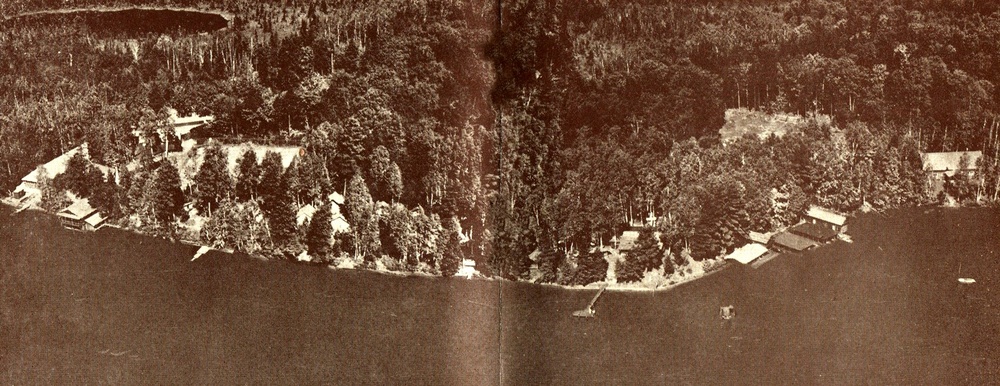 Camp from the Air. From the 1938 La Jeunesse brochure: (Courtesy of Jan Clark Daly)
Camp from the Air. From the 1938 La Jeunesse brochure: (Courtesy of Jan Clark Daly)
References
Mr. Jules Aubry___________________________Yonkers, N.Y.
Mr. C. N. Bliss, Jr._________________________New York, N.Y.
Mrs. Thomas Bradley_____________________Washington, D.C.
Mr. Seaver B. Buck___________Berkshire School, Sheffield, Mass.
Mr. Frank D. Cheney_____________________Manchester, Conn.
Mr. William J. Clothier____________________Valley Forge, Pa.
Mrs. J. Lloyd Coates________________________Ardmore, Pa.
The Rev. Dr. Henry Darlington_______________New York, N.Y.
Mr. Roger A. Derby_______________________Cedarhurst, L.I.
Dr. G. E. DeSchweinitz,_____________________Philadelphia, Pa.
Mr. Albert B. Dick, Tr._______________________Lake Forest, Ill.
Mr. George S. Ebbert_________________________Pittsburg, Pa.
Mr. Lincoln Ellsworth_______________________New York, N.Y.
Mr. Malcolm H. Farmer____________________New Haven, Conn.
Mr. H. L. Ferguson________________________Greenwich, Conn.
Mr. Gordon Grand________________________Greenwich, Conn.
Mrs. Frederick G. Gratwick_____________________Buffalo, N.Y.
Mrs. B. L. Hardin________________________Washington, D.C.
Mr. E. Roland Harriman____________________New York, N.Y.
Mr. Henry Frazer Harris___________________Philadelphia, Pa.
Mr. Arthur Hellen________________________Washington, D.C.
Mrs. John M. Hopkins_________________________Keswick, Va.
Mr. H. S. Hotchkiss_______________________New Haven, Conn.
Mr. Alfred G. Kay_________________________Palm Beach, Fla
The Rev. Dr. Arthur Lee Kinsolving______________Boston, Mass.
Mr. A. R. Lawton____________________________Savannah, Ga.
Mrs. F. D. Lewis__________________________Philadelphia, Pa.
Mr. F. W. Lincoln, Jr._______________________New York, N.Y.
Mr. Francis V. Lloyd, Jr.__________St. Paul's School, Concord, N.H.
Mr. Horatio G. Lloyd _____________________Philadelphia, Pa.
Rev. William B. Lusk ____________________ Ridgefield, Conn.
Mr. Woodruff Marston________University School, Baltimore, Md.
Mr. William W. Mathewson________________Washington, D.C.
Mr. J. A. McCurdy___________________________Mt. Airy, Pa.
Mrs. A. E. Newbold_______________________Philadelphia, Pa.
Mr. T. Jefferson Newbold_____________________Boston, Mass.
Mr. Eric Parson___________Santa Barbara School, Carpenteria, Cal.
Mr. C. J. Peck_____________________________Cleveland, Ohio
Mr. W. L. L. Pelts___________________________Albany, N.Y.
Mr. J. H. Perkins_________________________Greenwich, Conn.
Mr. David Remer____________________________Mt. Airy, Pa.
Mr. Ralph S. Richards________________________Sewickley, Pa.
Mr. Avery Rockefeller_____________________Greenwich, Conn.
Mrs. Theodore Roosevelt___________________Long Island, N.Y.
Hon. James R. Sheffield_____________________New York, N.Y.
Mr. R. Douglas Stewart_____________________Chicago, Ill.
Mrs. Russell Thayer________________________Philadelphia, Pa.
Mr. Leonard Tufts__________________________Pinehurst, N.C.
Mrs. F. C. Walcott_________________________New York, N.Y.
Dr. Allen E. Walker________________________Washington, D.C.
Mr. H. H. D. Walker_______________________Washington, D.C.
Mr. John Y. G. Walker______________________New York, N.Y.
Mrs. Joseph E. Washington__________________Cedar Hill, Tenn.
Mr. Louis S. Weeks________________________Cedarhurst, L.I.
Mr. L. Caspar Wister_______________________Wynnewood, Pa.
Mr. A. O. Wheeler____________________________Sidney, B.C.
Dr. J. S. Wheelwright______________________New York, N.Y.
External link:
- Merrill Thomas real estate listing of "Camp Conor," the former Alumni Lodge of La Jenuesse, with many photographs
See also:
Comments



